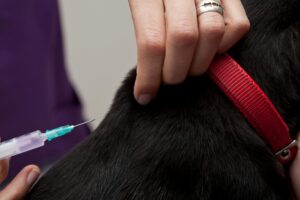Introduction
We treat our pets like family members. Pets face about the same health problems as their human owners. Knowing these common diseases enables you to look after your furbaby in a much better way, offering them a long life, health and happiness. This is why the pet health problems that are prevalent cannot be ignored.
Common Pet Health Problems
1. Obesity
Overview: Obesity is a growing problem in our pets, especially dogs and cats. Excessive weight can cause serious health issues like diabetes, cardiovascular disease and arthritis. Pets become obese due to overfeeding, lack of exercise and high-calorie food.
Prevention and Treatment: To prevent obesity; regular exercise for your pet and attention to the diet are key. Don’t overfeed and avoid treats. Obese pets should contact the clinic for a weight loss program; They may start advising you on special food and exercise, especially custom-made for your pets.
2. Dental Disease
Overview: Dental problems are very common in our pets, from bad breath to more severe problems like periodontal disease. Dental disease also affects the general health of your animal, and it can cause complications of the heart, liver, and kidney.
Prevention and Treatment: Brushing your pet’s teeth regularly and feeding dental treats can keep the mouth clean. Yearly dental check-ups with your vet are essential. If the plaque and tartar have built up you may require professional cleaning from your local dental clinic.
3. Parasites
Overview: Fleas, ticks and worms are nasty little parasites that can irritate pets AND humans! These parasites cause skin disease, anemia, and more serious diseases such as Lyme infection and heartworm.
Prevention and Treatment: Utilize the preventive treatments that your vet may suggest, like spot-on treats, oral medications, or collars. Always inspect your pet for parasites, and see a vet if you suspect any signs of infestation. Clean your home and your yard to prevent the spread of infestation.
4. Skin Allergies
Overview: Skin allergies can be created by food, the environment, or flea bites. Signs include paw chewing and scratching, licking or rubbing ears and moist, reddened skin. Secondary infections are another related risk of untreated allergies and in severe cases can be life-threatening.
Prevention and Treatment: Treatment plans could include nutritional changes, medications or the use of topical treatments to help mitigate possible symptoms. Frequent allergy-free grooming and bathing in hypoallergenic shampoos have been shown to be the best tools for reducing allergen exposure in affected individuals.
5. Arthritis and Joint Problems
Overview: This condition typically occurs in older pets, frequently found in larger dog breeds. Signs of this condition also include lameness, decreased range of motion if the elbow hurts at rest and reduced daily walking. Joint issues can really reduce your pet’s quality of life.
Prevention and Treatment: Keep your dog at normal body weight and consider adding joint supplements if advised by your vet. The joints remain healthy with mild exercise, regularly. If your pet has arthritis, our vet may recommend pain relief or anti-inflammatory medications. Massages and acupuncture can also help.
6. Urinary Tract Infections (UTIs)
Overview: UTIs are exceedingly common in both dogs and cats, leading to painful urination, straining to urinate, and accidents in the house. Untreated UTIs can also progress to more serious kidney-related issues.
Prevention and Treatment: Provide fresh water at all times and give frequent bathroom breaks If your dog shows any evidence of a UTI, seek medical evaluation for suspected diagnoses and care options like antibiotics. Prevent re-infestation by feeding a urinary health-specific diet.
7. Ear Infections
Overview: Ear infections are common in dogs with floppy ears but can occur in any pet they affect. Symptoms: head shaking, ear scratching and smelly ears There are three main causes for ear infections: bacteria, yeast, and/or an allergy.
Prevention and Treatment: Keep your pet’s ears clean and dry, especially after baths or swimming. Having regular ear check-ups and cleanings done can be helpful in preventing infections. If your puppy gets an infection, your vet may suggest ear drops or other medications. Yet addressing the underlying causes, like allergies can help prevent further infections from occurring.
8. Gastrointestinal Issues
Overview: Most pets can have gastrointestinal issues such as vomiting, diarrhea, and constipation. They may be due to dietary indiscretion, an infection, or something more serious like pancreatitis or inflammatory bowel disease.
Prevention and Treatment: Give your pet a stable, good diet and restrain from feeding them table scraps or any obscure things they should not eat. Give them access to fresh water all the time. If your dog experiences chronic, or recurring gastrointestinal problems, it is best to see a vet and discuss Oct points about diagnosis and treatment if dietary changes don’t do the trick.
What Can You Do?
Pet health is very important and as a pet owner, it’s your responsibility to take good care of your pet. Here are some general tips:
- Regular Vet Visits: The same principle applies to the human aspect of health care, going to routine check-ups can mean catching things early.
- Balanced Diet: Provide your pet with a quality diet appropriate for their age, size and health status.
- Exercise: Exercise is good for your pup to keep in shape and keep them healthy.
- Preventive Care: Make sure you use preventative medications to help protect against parasites and keep up with your vet’s suggested vaccinations and dental care.
- Monitor Your Pet: Observe changes in behavior, appetite or physical state as you normally would and discuss any abnormalities with your vet.
Transitioning to a Healthier Lifestyle
If you plan to alter your pet’s diet or exercise, do so slowly. A sudden change causes stress and may stomach problems. Now you are eating well and exercising but make sure these changes are gradual as rapid changes provides your body with potential deficiencies. If that is the case, please make sure to check with your vet before making any drastic changes so that it is safe for your pet.
Conclusion
By learning about more common pet health problems and what you can do to prevent or treat them, you’ll be armed with the knowledge to keep your pet happy and healthy. Routine veterinary visits, a well-balanced diet and preventative care are the building blocks of good pet health. Be proactive and well-informed, and your four-legged will reward you with years of affectionate loyalty.




